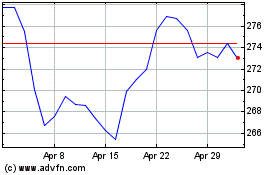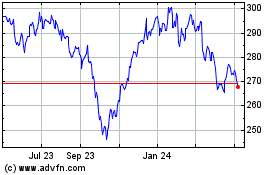By Paul Page
Sign up: With one click, get this newsletter delivered to your
inbox.
From coal production sites in Appalachia to poultry farms and
chemical plants along the eastern U.S. seaboard, companies say
they're feeling the pain from deep service problems along CSX
Corp.'s troubled freight rail network. Congestion, delays and
erratic operations are hitting the railroad from Chicago down to
Florida, the WSJ's Paul Ziobro reports, and companies are telling
regulators and lawmakers that CSX's problems are undermining their
business. One customer, chemical company Chemours, says it slowed
production and has been "hanging by a thread" awaiting long-stalled
raw materials, and customers including McDonald's Corp. and Kellogg
Co. have turned to costlier truck transport. The woes arise from
the rapid-fire, rough rollout of new CSX chief Hunter Harrison's
effort to streamline operations and set the "precision railroading"
that Mr. Harrison touts. The CEO insists CSX is fixing bottlenecks
as the company pushes forward on long-term plan, and he's promising
bigger improvements next month. But if the problems persist into
the fall the calls for regulators to intervene will grow
louder.
Imports are hitting U.S. ports in big numbers this summer as
retailers stock up with newfound confidence and shipping companies
reap the benefits. American ports saw near-record levels of
container imports last month, WSJ Logistics Report's Erica E.
Phillips writes, in a booming start to the peak shipping season
that looks likely to deliver a financial boost to long-beleaguered
maritime operators. The coast-to-coast surge is especially heavy in
furniture, back-to-school goods and auto parts, trade data service
Panjiva says, and it comes along with more reports that U.S.
consumers are more confident in the economy. The push to the ports
may come from more than the retail consumer market, however.
Supply-chain management group Unis Co. says it's seeing a pickup in
industrial materials such as those auto parts. That could signal
more activity in the manufacturing sector, including plans by
companies to ramp up U.S. factory work later in the year.
While most of North America is focused on efforts to rewrite the
continent-wide trade pact, the five-year-old agreement between the
U.S. and South Korea is coming under fresh debate. The countries
wrapped up new talks over their free-trade deal this week, the
WSJ's Kwanwoo Jun reports, with the U.S. still insisting the
agreement needs to be reworked and Seoul opposing any changes
without an objective joint study. Like the talks over the North
American Free Trade Agreement, the move on what's known as the
Korus FTA is dividing the U.S. business community. Meat exporters
and the U.S. Chamber of Commerce like the pact the way it works
now. But the American auto and steel industries want a rewrite as
they watch heavy loads of imports head into the country. The Trump
administration says South Korea is partly to blame for a global
glut in steel, effectively positioning Seoul against an industry
that's been central to the White House's pitch to industrial
America.
ECONOMY & TRADE
All those package carriers hitting the streets may get some side
work pushing for a corporate tax rewrite. United Parcel Service
Inc. hosted U.S. House Ways and Means Chairman Kevin Brady (R.,
Texas) at its Louisville, Ky., air hub, the WSJ's Richard Rubin
reports, and bolstered the chairman's pitch to rewrite the tax code
with a call for employees and customers to join the effort. Beyond
a television ad campaign and corporations' roster of Washington
lobbyists, companies are trying to rally broader public support for
business tax cuts this year, inviting senior lawmakers to their
facilities and encouraging workers to contact their members of
Congress. UPS Chief Executive David Abney says the company's more
than 300,000 workers should understand that a lower corporate tax
rate help workers because "it benefits our customer. It will create
more packages for us" and create jobs. Labor leaders say workers
should be more skeptical, and there are still deep disagreements
among businesses and lawmakers about overhauling taxes.
QUOTABLE
IN OTHER NEWS
China's yuan has risen 4% against the dollar since January.
(WSJ)
Mexico chalked up its 16th straight quarter of economic growth
in the April-to-June period. (WSJ)
Recent share moves on Wall Street suggest investors are giving
up on the Trump administration's infrastructure push. (WSJ)
The U.S. is preparing a proposal to let the U.S. withdraw from a
corporate arbitration system at the heart of the North American
Free Trade Agreement. (WSJ)
LG Electronics Inc. will build a factory in Michigan to make
electric car parts. (WSJ)
The U.S. Treasury targeted Chinese coal exporters in new
sanctions at companies and individuals it says aided North Korea's
nuclear weapons program. (WSJ)
Ford Motor Co. will start a company to make electric cars in
China in a joint venture with local auto maker Anhui Zotye
Automobile Co. (WSJ)
European antitrust regulators will launch an in-depth look at
Bayer AG's $57 billion acquisition of Monsanto Co. (WSJ)
Retailer Kohl's Corp. plans to open a fifth e-commerce
fulfillment center and four small-format stores this quarter.
(MarketWatch)
Australian mining giant BHP Billiton Ltd. is looking at selling
its U.S. oil and gas operations. (WSJ)
Upstart financing firm Affirm Inc. is in talks to offer
installment loans through Wal-Mart Stores Inc. (WSJ)
Alevo USA Inc., a North Carolina energy storage startup tied to
a Russian billionaire tycoon, filed for bankruptcy. (WSJ)
International Business Machines Inc. signed Tysons Foods Inc.,
Unilever Plc and other big food and retail companies to its test of
blockchain technology in the supply chain. (Reuters)
Tanker operators are scrapping more very large crude carriers
this year as spot earnings fall to three-year lows. (Lloyd's
List)
The Port of Los Angeles plans to spend $13 million to bring
cargo data from its terminals and shipping lines under a single
platform. (Daily Breeze)
Canadian National Railway Ltd. carried a record 21.8 million
metric tons of grain in the just-ended crop year. (Materials
Management & Distribution)
The American Trucking Associations' truck tonnage index rose
0.1% from June to July. (Transport Topics)
Chinese autonomous-truck company TuSimple is setting up a
research and testing site in Tucson, Ariz. (Tucson Sentinel)
Blue Apron Holdings Inc. lost its human resources chief,
implemented a hiring freeze and fired part of its recruiting team.
(Bloomberg)
Indian e-commerce company Paytm will invest $35 million in
strengthening its logistics network. (Economic Times)
FedEx Corp.'s ground unit will open a $30 million parcel sorting
center in Chattanooga, Tenn., next month. (Chattanooga Times Free
Press)
ABOUT US
Paul Page is deputy editor of WSJ Logistics Report. Follow him
at @PaulPage, and follow the entire WSJ Logistics Report team:
@brianjbaskin , @jensmithWSJ and @EEPhillips_WSJ. Follow the WSJ
Logistics Report on Twitter at @WSJLogistics.
Write to Paul Page at paul.page@wsj.com
(END) Dow Jones Newswires
August 23, 2017 06:38 ET (10:38 GMT)
Copyright (c) 2017 Dow Jones & Company, Inc.
McDonalds (NYSE:MCD)
Historical Stock Chart
From Mar 2024 to Apr 2024

McDonalds (NYSE:MCD)
Historical Stock Chart
From Apr 2023 to Apr 2024
